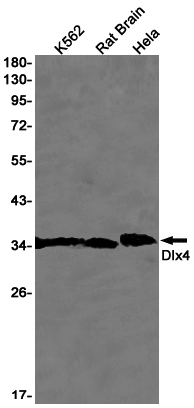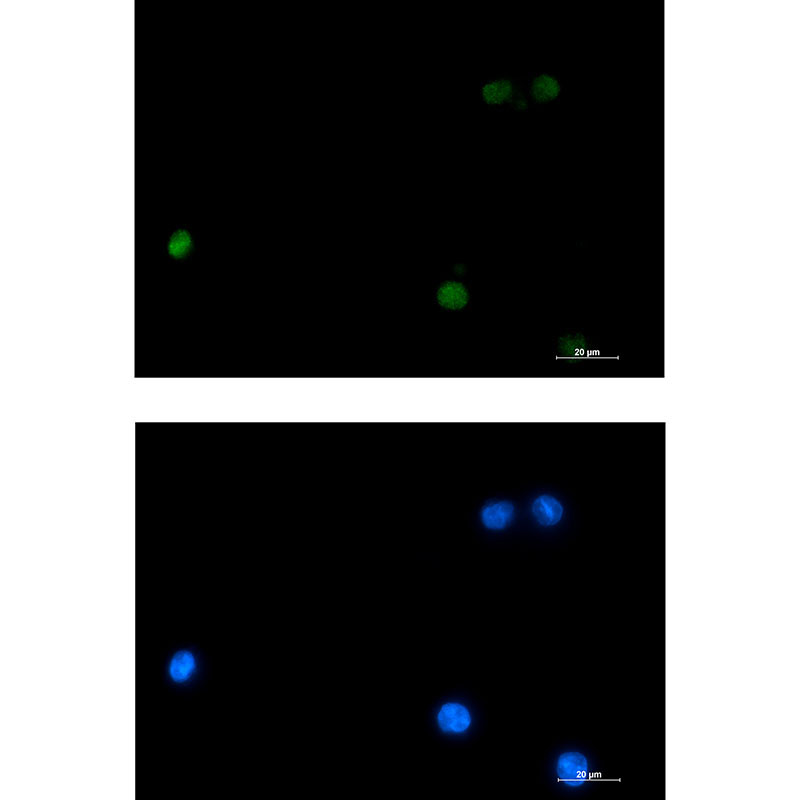

| WB | 咨询技术 | Human,Mouse,Rat |
| IF | 1/20 | Human,Mouse,Rat |
| IHC | 咨询技术 | Human,Mouse,Rat |
| ICC | 1/50-1/200 | Human,Mouse,Rat |
| FCM | 咨询技术 | Human,Mouse,Rat |
| Elisa | 咨询技术 | Human,Mouse,Rat |
| Aliases | DLX4; BP1; DLX7; DLX8; DLX9; Homeobox protein DLX-4; Beta protein 1; Homeobox protein DLX-7; Homeobox protein DLX-8 |
| Entrez GeneID | 1748 |
| WB Predicted band size | Calculated MW: 26 kDa; Observed MW: 35 kDa |
| Host/Isotype | Rabbit IgG |
| Antibody Type | Primary antibody |
| Storage | Store at 4°C short term. Aliquot and store at -20°C long term. Avoid freeze/thaw cycles. |
| Species Reactivity | Human,Rat |
| Immunogen | A synthetic peptide of human Dlx4 |
| Formulation | Purified antibody in TBS with 0.05% sodium azide,0.05%BSA and 50% glycerol. |
+ +
以下是关于DLX4抗体的模拟参考文献示例(非真实文献,仅供格式参考):
---
1. **文献名称**: *DLX4 Expression in Breast Cancer: A Prognostic Marker Study*
**作者**: Smith A, et al.
**摘要**: 本研究通过免疫组化(IHC)分析DLX4蛋白在乳腺癌组织中的表达,发现DLX4高表达与肿瘤侵袭性和不良预后显著相关,提示其可能作为乳腺癌治疗的潜在靶点。
2. **文献名称**: *DLX4 Antibody Validation for Epigenetic Regulation Studies*
**作者**: Chen L, et al.
**摘要**: 文章验证了DLX4抗体在Western blot和免疫荧光中的特异性,并发现DLX4通过调控表观遗传修饰因子参与卵巢癌细胞的耐药机制。
3. **文献名称**: *DLX4 in Placental Development and Preeclampsia*
**作者**: Gupta R, et al.
**摘要**: 利用DLX4抗体检测胎盘组织中DLX4的时空表达模式,发现其表达异常与子痫前期病理过程相关,可能影响滋养层细胞功能。
4. **文献名称**: *DLX4 as a Biomarker in Non-Small Cell Lung Cancer*
**作者**: Wang Y, et al.
**摘要**: 通过DLX4抗体分析肺癌患者组织样本,证实DLX4过表达与EGFR信号通路激活及患者生存率下降相关,提出其作为肺癌分层的生物标志物。
---
**注意**:以上文献为模拟示例,实际研究中请通过PubMed、Google Scholar或Web of Science等平台检索关键词(如“DLX4 antibody”、“DLX4 cancer”等)获取真实文献。
The DLX4 antibody is a crucial tool in studying the DLX4 (Distal-less homeobox 4) protein, a member of the homeodomain-containing transcription factor family. DLX4. also known as BP1. plays roles in embryonic development, particularly in limb, craniofacial, and hematopoietic system formation. Its gene is located on human chromosome 17q21-22 and encodes multiple splice variants. While DLX4 is minimally expressed in normal adult tissues, its aberrant overexpression has been implicated in various cancers, including breast, ovarian, lung, and gastric cancers, where it promotes tumor progression, metastasis, and therapy resistance by regulating genes involved in apoptosis, angiogenesis, and epithelial-mesenchymal transition (EMT).
DLX4 antibodies are primarily used in research to detect protein expression patterns via techniques like immunohistochemistry (IHC), Western blotting, and immunofluorescence. These antibodies help identify DLX4's subcellular localization (nuclear and/or cytoplasmic) and quantify its upregulation in malignant versus normal tissues. Studies using DLX4 antibodies have revealed its potential as a prognostic biomarker, with higher expression correlating with advanced tumor stages and poorer clinical outcomes. However, challenges remain in standardizing antibody specificity due to sequence similarities among DLX family members and splice variants. Ongoing research aims to clarify DLX4's dual roles in development and oncogenesis, leveraging these antibodies to explore therapeutic targeting strategies.
×